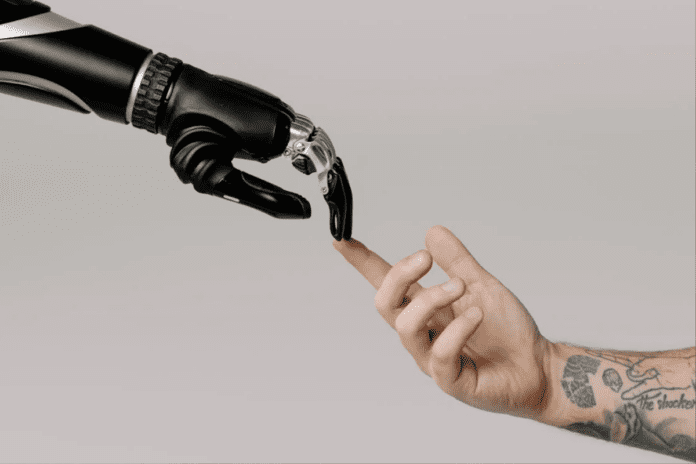Is your company a new player in the B2B industry? In that case, you must know about the impact of AI on this market.
You’ve got it all—predictive analytics, natural language processing, automation, and more. These AI-based technologies have revolutionized this industry and ushered in a new era of innovation and efficiency. Forrester reports that 2/3 of B2B businesses use AI in their marketing tactics. According to Bernard Marr, AI helps B2B organizations create better products and services.
Are you ready to enhance your company’s decision-making skills, optimize how the business operates, and unlock unique opportunities? In this blog post, we’ll discuss three ways AI technology is reshaping the B2B industry for the better.
#1. Generative AI
Reports suggest businesses using generative AI saw a 15% boost in lead conversions. This type of technology has revolutionized B2B operations in many ways. Examples include content creation, website design, customer engagement, etc.
In most cases, B2B companies use generative adversarial networks (GANs) to automate the generation of:
- Text
- Images
- Code
A good example of this would be AI website-building tools. According to Hocoos, anyone can build a professional-looking business site within seconds after answering a few questions. With AI website builders, B2B leaders can easily:
- Create web pages filled with unique design elements.
- Generate engaging content that they can edit.
- Upload compelling images to attract clients.
Designing a B2B website from scratch can cost you between USD 10,000 and USD 250,000. However, AI tools can do it for just USD 150 a year. The best part is that B2B organizations can easily use email marketing and upload unlimited images to AI-generated websites. You can even hire professionals later on to make this website better.
All in all, generative AI helps streamline workflows and accelerates innovation to personalize content pieces and websites. You can gain a competitive advantage after effectively harnessing such tools.
#2. Natural Language Processing (NLP)
Industry leaders believe that the NLP framework is helping B2B companies leverage techniques that drive buyers toward making a purchasing decision. It’s allowing machines to interpret and understand customer behavior. NLP can also generate human language and offer a personalized experience to your audience.
This AI-based technology can do all that because of the following reasons:
- It uses sentiment analysis to understand demographics and predict their decisions.
- The technology uses language translation to offer assistance to clients asking questions.
- Text summarization techniques can enhance communication and streamline workflows in a B2B company.
NLP can extract insight from unstructured data sources. Examples include emails and customer feedback. The applications include chatbots integrated into a B2B website to provide instant customer support. Moreover, the use of advanced data analytics can help you with competitor analysis.
NLP allows you to personalize engagements and automate repetitive tasks. With this, you can scale your B2B brand while addressing data privacy issues.
#3. Predictive Analytics
According to Google Cloud, predictive analytics is the unique process of using existing data to forecast the future for your company and determine business outcomes. Almost 84% of marketers use predictive analytics.
In the B2B landscape, this AI-based technology is set to change how you forecast future trends and analyze business operations. Here’s how:
- B2B organizations can determine market fluctuations to anticipate demand.
- You also get to optimize pricing strategies to help mitigate any risks.
- Businesses can proactively enhance decision-making and streamline resource allocation.
- You can identify untapped opportunities to personalize client experiences.
Predictive analytics truly help you stay ahead of the competition by enhancing accurate decision-making and fostering a robust data-driven framework.
The Future of AI in the Evolving B2B Industry
The future seems bright for AI in the ever-evolving B2B industry. You can expect unprecedented transformation and innovation in business operations. Some AI-based tools that will eventually heighten efficiency and enhance personalization in the B2B sector include:
- Customer relationship management (CRM) software for better sales
- Chatbots to offer 24/7 support to leads, prospects, and clients
- Use of AI-powered website generators and content tools for better marketing
AI is set to revolutionize decision-making in this market. For instance, your company can leverage predictive analytics to determine future market trends and craft a better plan. Autonomous systems are here to drive competitiveness and agility to allow B2B organizations to meet the dynamic market demands.
Even then, considerations like data privacy and workforce upskilling remain critical. You need to keep these ethical considerations in mind to drive growth and redefine your place in the industry.
In summary, AI integration marks a massive shift in the B2B landscape. With this, you can achieve an unprecedented growth and resilience opportunity.
For example, predictive tools can help you analyze industry trends, and you can build websites with generative AI. Similarly, NLPs can help with 24/7 customer service and improve business operations. All these can eventually enhance productivity and offer deeper insight.
As a B2B business owner, you must strategically implement these technologies and be aware of ethical considerations. Leverage AI to proactively address challenges and navigate the evolving B2B landscape.










